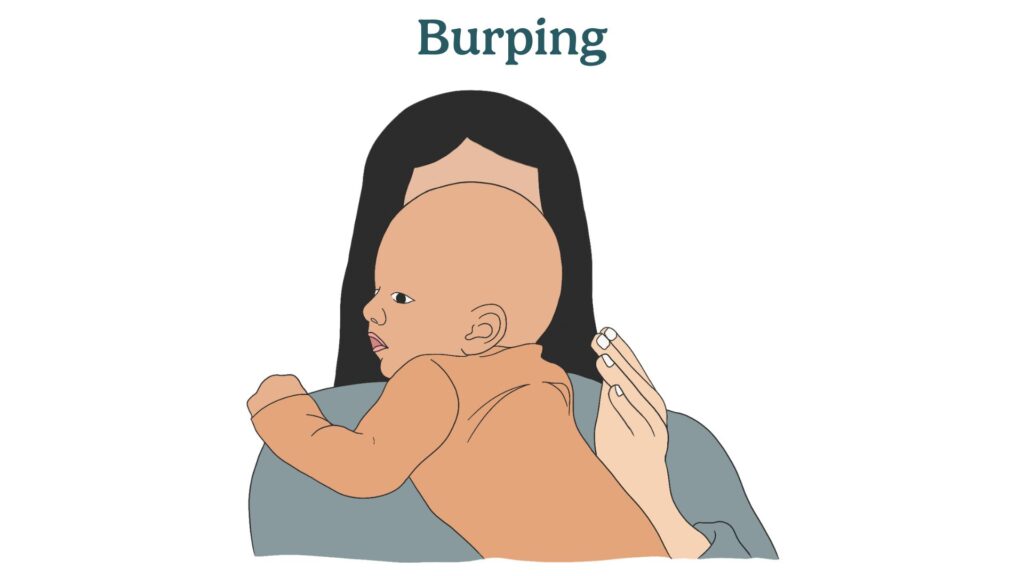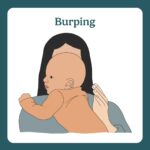burping

Burping
Burping is the act of helping your baby release air that they may swallow during feedings. Babies tend to take in air while breastfeeding, bottle feeding, or crying, and burping helps release it to prevent discomfort.
Since babies can’t burp well on their own, they rely on you to gently help them expel the trapped air.
Because air moves upward, hold your baby more upright during burping sessions and be sure to support their head.
What to watch out for
Burping is a simple process, but here are a few things to keep in mind to ensure your baby stays comfortable:
- Fussiness or pulling off during feeding: If your baby becomes fussy, arches their back, or pulls off the breast or bottle mid-feed, they might need to burp. Pause the feeding and try to burp them before continuing. Frequently, squirming with their shoulders is a sign baby needs a burp.
- Overfeeding: Babies sometimes swallow more air when overfeeding, especially with fast-flowing bottles. Feeding in smaller amounts can help reduce the need for frequent burping.
- Spit-up after burping: It’s common for babies to spit up a small amount while burping. If the spit-up is excessive or forceful, it may be a sign of overfeeding or reflux. Most babies are “happy spitters,” meaning they aren’t bothered by the spit-up. If they are struggling with low weight gain and are upset when they spit-up, follow up with your pediatrician.
- Difficulty burping: If your baby struggles to burp, try adjusting their position. You can hold them upright against your chest, over your shoulder, or seated on your lap while supporting their head and chest. Gentle pats or rubs on their back can help. You can also try gently tilting baby side to side to help the air bubbles work their way out.
Physical limitations or health circumstances
Certain situations can make burping more challenging or frequent:
- Reflux: Babies with gastroesophageal reflux may benefit from more frequent burping to minimize discomfort.
- Prematurity: Premature babies might need extra time and gentle handling while burping due to their smaller size and less developed muscles.
- Tight latch: A poor latch during breastfeeding or bottle feeding can cause your baby to swallow more air, leading to more burping needs. Work on improving the latch with the help of a lactation consultant if necessary. For guidance on improving latch, refer to Breastfeeding Latch: The First Fundamental of Breastfeeding.
Other terms
Here are some related terms that may help you better understand burping and its role in feeding:
- Let-down reflex: The flow of milk from the breast during feeding. If the let-down is too fast, it can cause your baby to swallow air and require more frequent burping.
- Spit-up: A small amount of milk brought up after a feeding or burping. Normal for most babies, but keep an eye on the frequency and amount.
- Feeding positions: Certain positions, like keeping your baby upright during and after feeding, can reduce the amount of air they swallow. For more on positioning, see The Position and Latch Checklist.
- Reflux: A condition where milk and stomach contents flow back into the esophagus, which may cause burping and spit-up.
- Overactive let-down: A fast milk flow that may cause your baby to gulp and swallow more air.
Burping is a natural part of feeding, and most babies need it to stay comfortable. With practice, you’ll find a rhythm that works for you and your baby.


